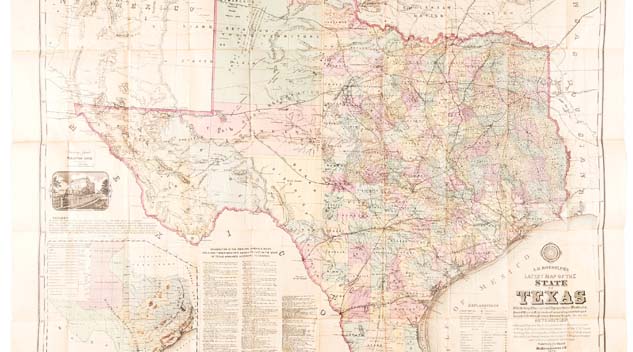#Heritages #Historical #Manuscripts #Auction #Texas #Beats #California #Antiques #Arts #Weekly
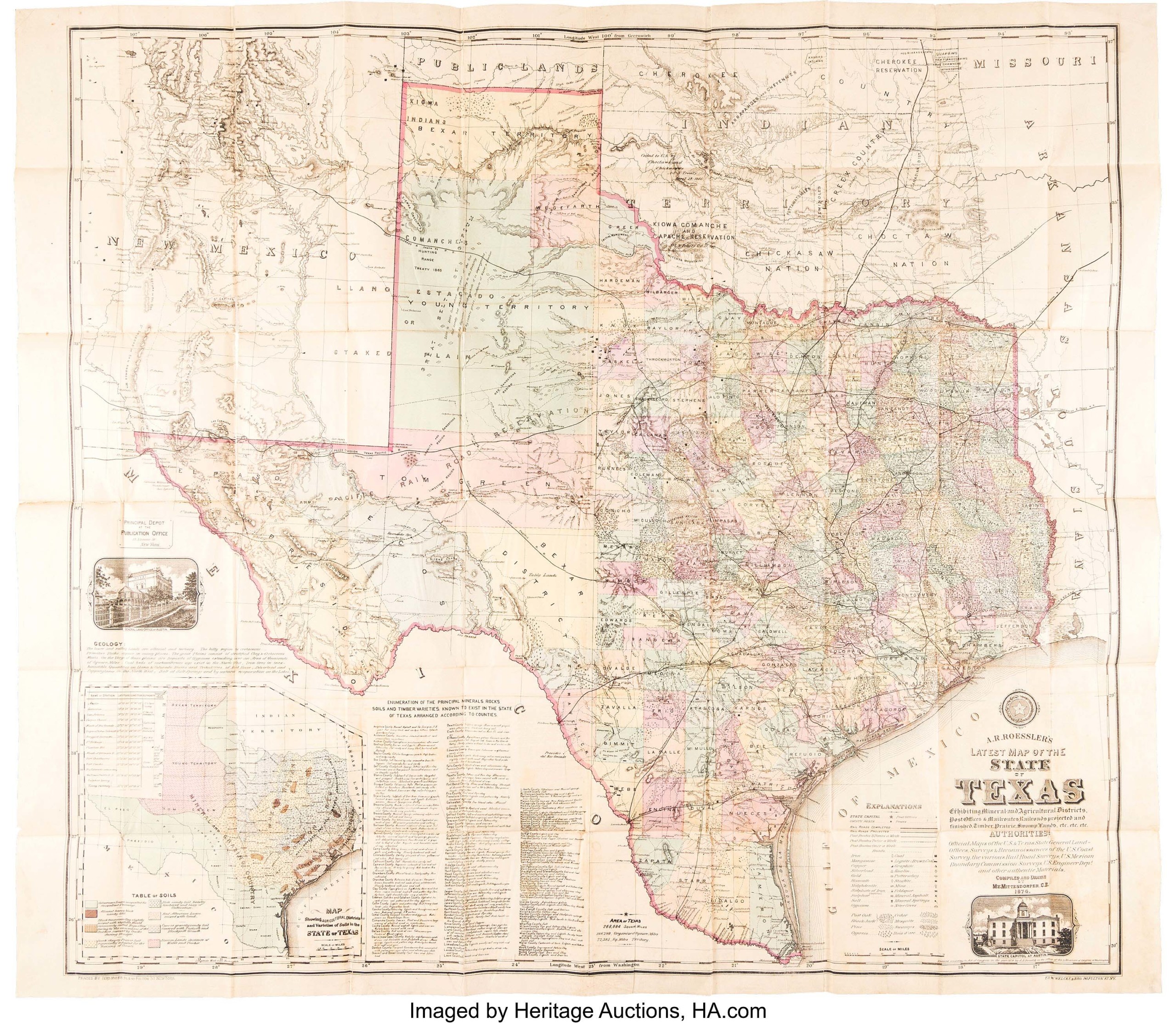
Earning the sale’s highest price was Anton R. Roessler’s Latest Map of the State of Texas Exhibiting Mineral and Agricultural Districts, Post Offices & Mailroutes, Railroads Projected and Finished, Timber, Prairie, Swamp Lands, etc. etc. etc., by M.V. Mittendorfer, published by Ed W. Welcke & Bro., N.Y., 1874, 44½ by 39¾ inches. It achieved $30,000.
Review by Carly Timpson; Photos Courtesy Heritage Auctions
DALLAS — Offering maps, letters, printed publications, documents, records, autographs and other historical papers, Heritage Auctions’ April 5 Historical Manuscripts auction realized a total of $1,161,760. More than 1,250 bidders were registered and of the 536 lots presented in the sale, 94 percent sold. Sandra Palomino, director of historical manuscripts, said, “Overall, the market for historical autographs continues to outperform…We were thrilled to see so many institutions participating along with our traditional collectors, which served to propel the bidding upwards.”
At the top of the sale was an 1874 geological and agricultural map of Texas. Anton R. Roessler’s Latest Map of the State of Texas Exhibiting Mineral and Agricultural Districts, Post Offices & Mailroutes, Railroads Projected and Finished, Timber, Prairie, Swamp Lands was highly detailed, including symbols that represent different soil types, rock and mineral deposits, tree species, mail routes at varying frequencies, post offices and railroads. According to the auction catalog, the hand-colored lithograph map is considered one of the best records of Texas’ agricultural and mineral wealth in the late Nineteenth Century. With its original dark green cloth cover, the folding map was won for $30,000.
An archive of letters and related documents written to, by and about William M. Gwin, one of California’s first two US senators, achieved $27,500. Spanning from 1805 to 1883, the archive included letters from political associates and family members, legislative resolutions, a pamphlet regarding the Wilkinson murder trial of 1839, checks and more.
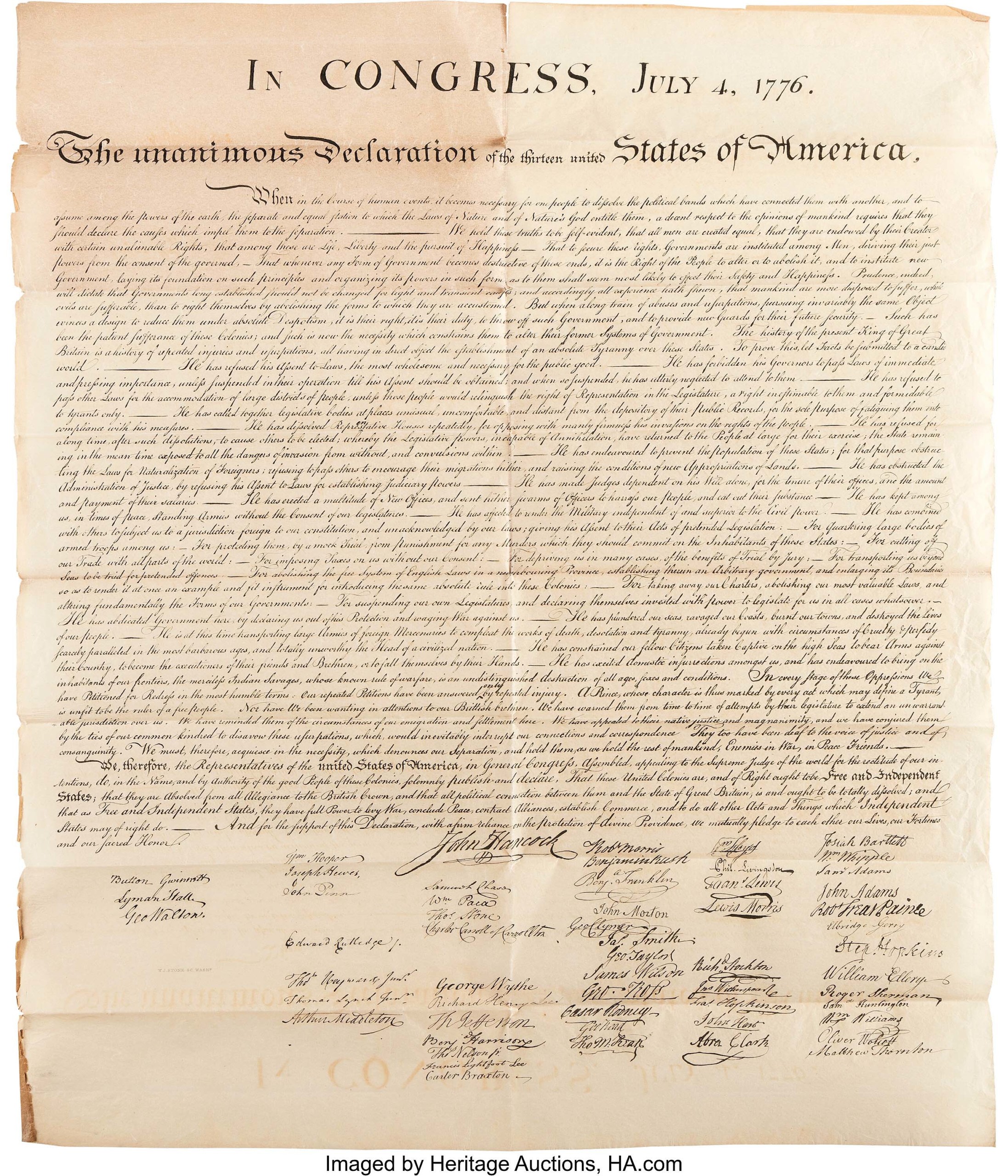
Peter Force’s 1833 printing of the Declaration of Independence, engraved by William J. Stone, copperplate engraving on rice paper, 27¾ by 30 inches, found a buyer for $21,875.
At $21,875 was a copperplate engraving of the Declaration of Independence, reprinted for Peter Force by William J. Stone. Stone’s copperplate of the Declaration of Independence was originally commissioned by John Quincy Adams in 1820, and Force, a historian and mayor of Washington, DC requested several more in 1833. This printing was included as an insert in Force’s American Archives: A Documentary History of the United States of America, Series V, Volume 1. “In addition to the printing’s historical rarity, it also reflects the democratic values upon which the young nation stood. Stone’s copperplate became the most familiar reproduction of the Declaration of Independence for early Nineteenth-Century Americans. At the same time, its existence also embodies a story of friendship and collaboration between two leading scholars in Nineteenth-Century America,” read the auction catalog.
In preparation for the Battle of Gettysburg, Robert E. Lee wrote a letter to Confederate General (then Colonel) Henry B. Davidson, addressing the organization of troops and supplies after learning of Union General George Meade’s advancements upon the post. The 1863 letter, signed by General Lee and docketed by Davidson, went out at $21,250.
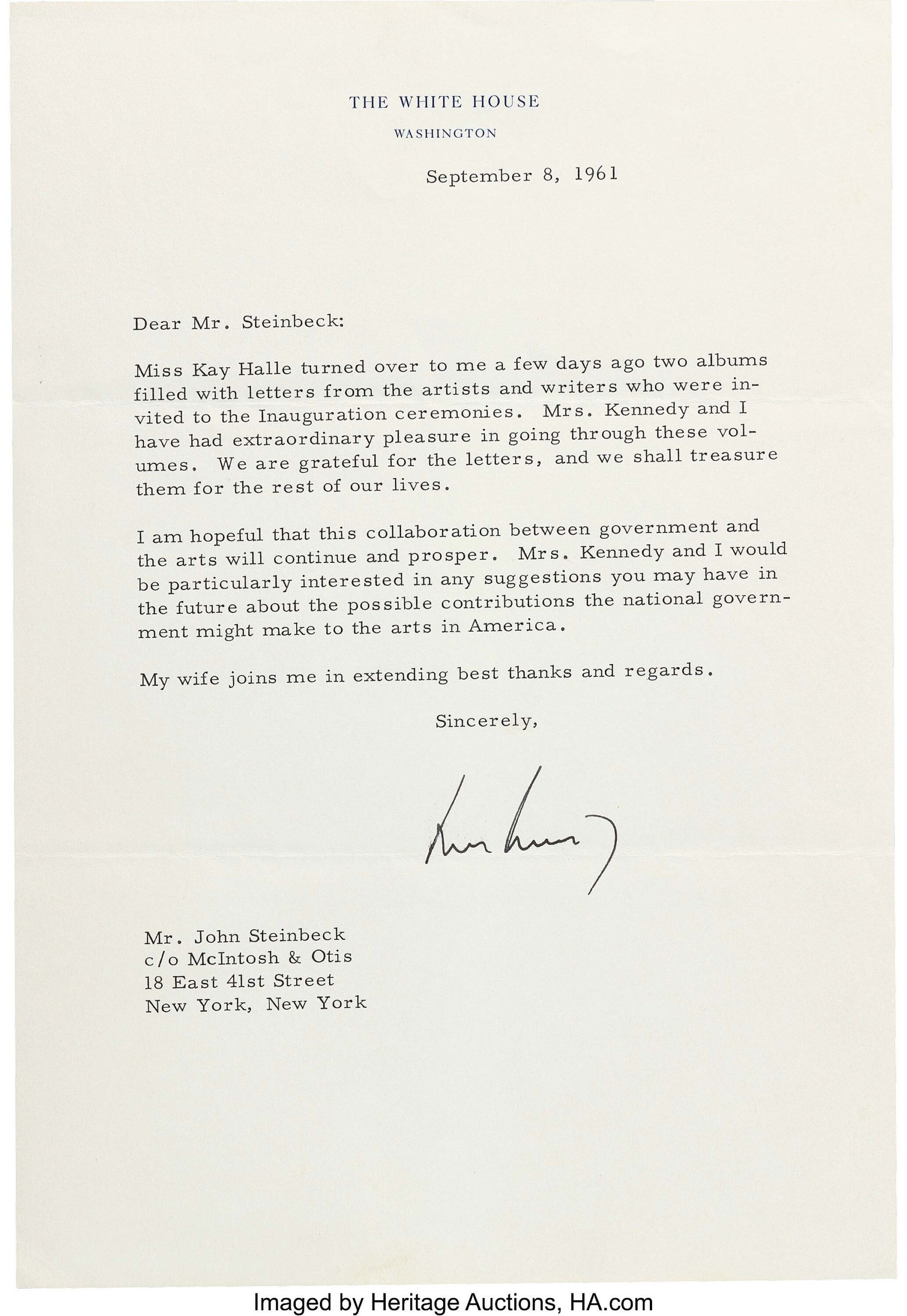
President John F. Kennedy’s signed letter to author John Steinbeck from September 8, 1961, typed on White House letterhead, 7 by 10¼ inches, elicited $20,625.
Several items relating to President John F. Kennedy were up for auction and successfully knocked down. One, a letter from Kennedy to Grapes of Wrath author John Steinbeck following the president’s inauguration, finished at $20,625. A member of Kennedy’s Inaugural committee, Kay Murphy Halle, suggested inviting members of the arts, sciences and humanities communities to the event and later presented Kennedy with a compilation of thanks from those individuals in attendance. Typed on White House letterhead, Kennedy relayed his appreciation of Steinbeck and wrote: “I would be particularly interested in any suggestions you may have in the future about the possible contributions the national government might make to the arts in America.” Two other items were presentation books. A copy of The White House: An Historic Guide (1962) was inscribed to Ralph Dungan and signed by the President and First Lady, Jacqueline Kennedy. This red leather-bound book was ruled, stamped and initialed in gilt; it sold for $11,875. A copy of Inaugural Addresses of the Presidents of the United States from George Washington 1789 to John F. Kennedy 1961, signed by Jackie Kennedy shortly after JFK’s assassination, went out for $16,250. Addressed to David Bell, the First Lady’s inscription read “The President was going to give you this for Christmas – Please accept it now from me with deepest appreciation / Jacqueline Kennedy / December 1963.”
A presentation copy of D-Day Prayer by President Franklin D. Roosevelt from the White House. June 6, 1944, signed and inscribed by Roosevelt as a gift to his granddaughter on her 18th birthday made $16,250. This 83rd copy of 100 limited edition printings was bound in vellum-backed marbled paper boards with a gilt-stamped leather spine and was with its original blue slipcase.
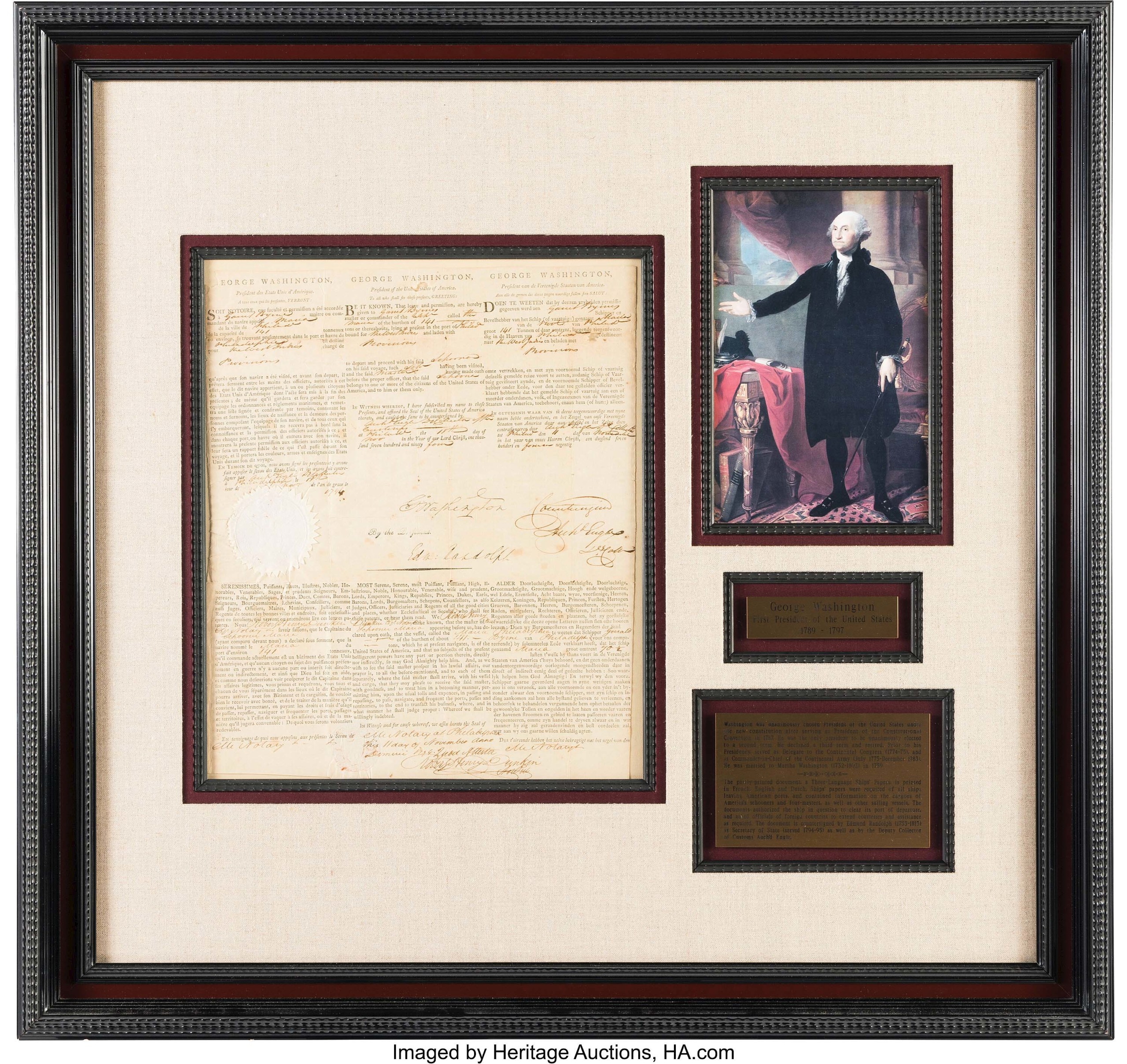
This framed three-language passport issued to Ganel Byrnes and signed by President Washington and Edmund Randolph, with a related portrait and plaques, 32¼ by 30¾ inches total, made $15,000.
There were also two historic three-languages ship’s passports signed by President George Washington. Achieving $18,750 was one from 1793 issued to John Brown, master or commander of the sloop Nancy, departing from the port of New London and heading to the West Indies with provisions. This passport, in French, English and Dutch, was countersigned by Thomas Jefferson as Secretary of State. Another issued in 1794 to Ganel Byrnes, master or commander of the ship Maria, set to depart Philadelphia for the West Indies, was countersigned by Secretary of State and Deputy Collector of Customs, Edmund Randolph. This passport was matted and framed alongside a portrait of Washington and two informational plaques. It finished at $15,000.
American Air Force navigator Theodore J. “Dutch” Van Kirk’s wartime flight records from April 1, 1941, to July 1946, which included the log sheet of the Hiroshima bombing from the Enola Gay, made an impact on bidders who ran the lot up to $18,750. Along with the record of the “Little Boy” atomic bomb release was documentation of Van Kirk’s Silver Star medal awarded to him for his part in the infamous mission. The folder contained all of the navigator’s missions while in the service, mostly typed carbon copies, and some live ink signatures.
Crossing the block at $13,750 was an 1831 letter from Ramón Músquiz, the political chief of Texas from 1828 to 1834. Addressed to the governor of Coahuila and Texas, José María Letona, Músquiz detailed and requested a resolution to a conflict between Mexican surveyor and land commissioner José Francisco Madero and Mexican brigadier general John (Juan) Davis Bradburn. The clash outlined in this letter is considered to be the tipping point in land disputes that ultimately led to the Texas Revolution.
Prices quoted include the buyer’s premium as reported by the auction house. On April 27, Heritage Auctions will conduct its Americana and Political, Minerals, Hollywood and Entertainment and Sports auctions. For more information, www.ha.com or 877-437-4824.

